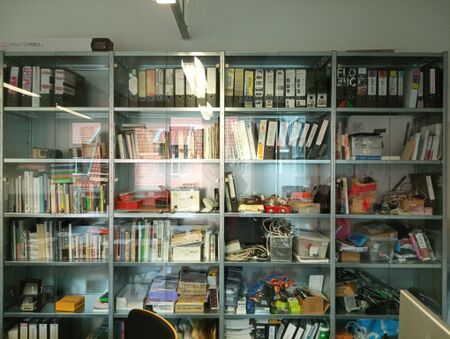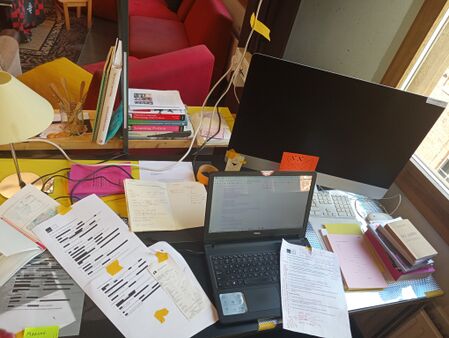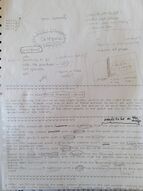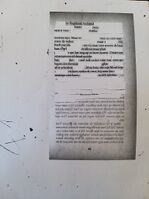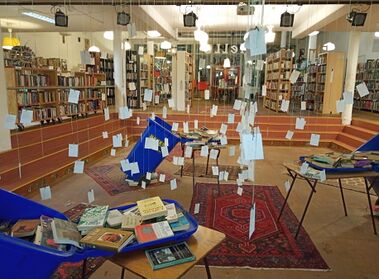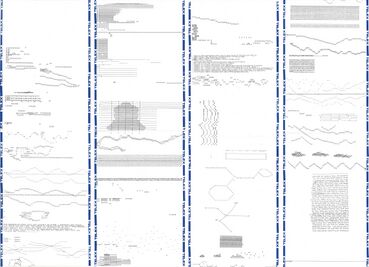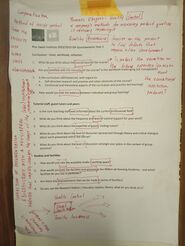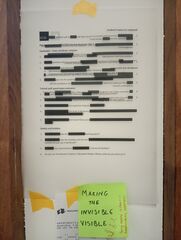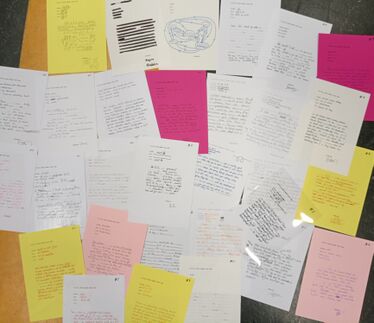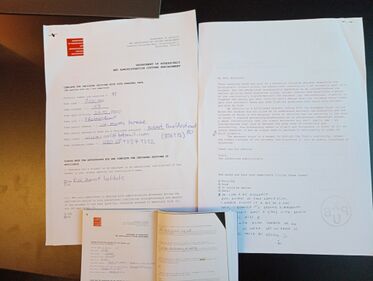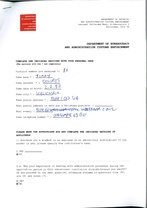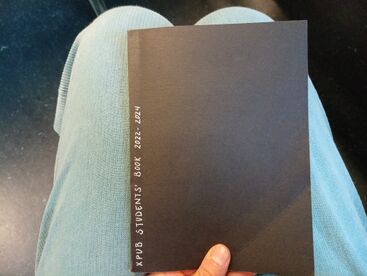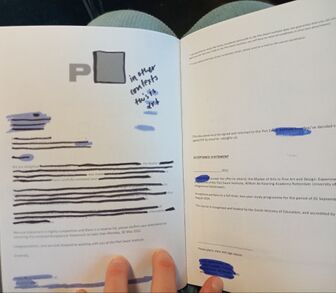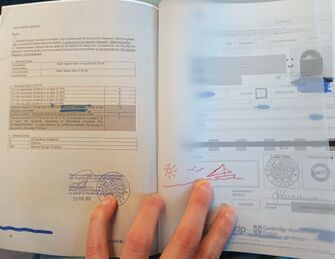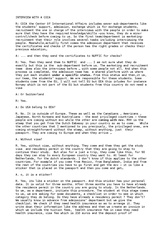User:₳(ɤ)ɠɭaḯa/P R O J E C T P R O P O S A L
Harragas, sometimes spelled Haraga (Harrag in the singular form) (from Algerian Arabic حراقة, ḥarrāga, ḥarrāg, "those who burn") are North African migrants who illegally immigrate to Europe or to European-controlled islands sometimes in makeshift boats. The term Harraga literally means “to burn” alluding to the migrants practice of burning their identity papers and personal documents in order to prevent identification by authorities in Europe. The North African men who partake in illegal migration refer to themselves as Harragas (burners) My friend Rabab introduced me this term <3
What do you want to make?
I would like to explore the bureaucratic dramaturgies within the educational institution I am currently part as a student. How bureaucratic rituals change through years inside the institution and how these established or de-established rituals constitute material evidence of its transformation. The main umbrella questions that float in my head and hopefully over my research are:
1) How the bureaucratic apparatus of higher education as a visible - invisible infrastructure can reflect policies regarding migration filter and border control and how this is reflected partly on the documents themselves?
2) How newly established bureaucratic rituals/structures can indicate or demonstrate the corporization of higher education?
3) How a bureaucratic document can (de)construct, classify or fragment the person and what disruption or conflict emerges when the personal story / experience / insight comes upon the artifact of a document?
I would dare to name – at the moment at least - the structure of this project as a counter-archive that will hold and embrace my field research. By the entity archive I perceive the collection and concentration of the material of my research that will attempt to create a parallel and possibly confronting narrative, putting together fragmented knowledge about the institution and address hopefully the above open-ended questions. By the prefix counter I want to reverse the given meaning of the archive as a closed structure/entity of knowledge belonging to the arkhē (those in power) and deal with questions of openness and public. Archive as a space of appearance of marginalized knowledge that provokes the emergence of discourse within the institution.
The archive will potentially have a twofold structure a physical/tangible form (a box/ a folder/ a holder / a shelf within the institution) and a digital form (a website, a wiki page, a platform).
“instead of regarding the archive as an institution that preserves the past as though its contents do not directly impact us, I propose to see the archive as a shared place, define it as shared place that enables one to maintain the past incomplete, or to preserve what Benjamin refer to as the “incompleteness of the past”” , (Azoulay, 2011)
The receivers and hopefully the sharers of this archival topos would be school’s inhabitants, students as well as employees. The question (for myself) is how an archive can invite others to gossip and talk around it, contribute and share stories. How a deposit of ongoing marginal knowledge related to school within the school can be activated and performed?
How do you plan to make it?
My research will attempt to extract and re-create knowledge using different means, steps and tools.
1. I will try to approach the administration territory in order to make questions on how the quality of the documents change through the years and towards which nationalities and guide a bit more my research. My intention is not to publish the interviews/discussions but mainly use this information to understand. I will ask for permission in order to have access to the empty forms through for a 20-year-old period in order to browse them and observe potential changes.
2. In parallel I would like to talk to COIA administrators. Since COIA (Center Of International Affairs) in collaboration with IND constitutes the first filter in the application process and they are the ones who are in charge of the students’ “scanning” (term used by COIA employee during our conversation). The main reason is to understand the possible friction of this intense relation between the two different but highly interconnected institutions and navigate myself.
3. Potential places that I will search for the required documents are the public websites of the institutions themselves, the RUAS, UvA, UU, IND, COIA, HINT etc.
4.Investigation of the organization NUFFIC (the dutch organization of internationalization of education) that is collaborating with educational institutions for more than a decade and is in charge of checking the validity of the diplomas via technology during the application process. I will also browse and keep notes on the fact-sheets that they produce every year with statistics on higher education.
4. I will keep checking the IND website to get a taste of the state’s narrative on migration and the forms/applications that are there. Maybe too ambitious plan. However, a browsing is for sure worth trying.
b. I will try to create a new folder/holder of the material focusing on the documents and looking more thoroughly the selected material at this stage by editing, highlighting, classifying them.
2. In parallel with the document investigation and the observations produced through this I am planning to organize a series of small talks with my peers – students of xpub and lens based media as the second part of this process. My intention at this point is to extract the intimate personal story behind the struggle of bureaucracy and talk about vulnerability and violence hidden behind the document.
* Also, in this case I will share the material with the interviewees and make sure they feel comfortable and everything is anonymous. Take care of including the ethics committee regulations of WDKA an keep in touch with them.
5. Playing around and messing with bureaucratic aesthetics, language and forms by creating small prototypes and distribute them to my peers (xpub1, xpub2, students, tutors). Forced memory story forms, stamps, questionnaires, leeszaal docs are ongoing experiments that will be included at the archive-holder at the end of the year.
What is your timetable?
NOVEMBER
• reading and annotating rituals • writing thesis 1st chapter • Leeszaal event preparation and event day 7/11/2023 • deadline for thesis outline and project proposal • first meeting on November 21st , 15:00 – 17:00 INSTITUTE’S PARTICIPATION COUNCIL (IMR) and notetaking • Fake assessement 27/10
DECEMBER
• reading and annotating rituals • browsing of the blank forms (In case I am allowed I will ask for a permission form to verify that I am able to access the old forms) • writing thesis 1st chapter • keep looking through the public forms and documents • deadline for assessment • real assessment 11/12/2023
JANUARY
• reading and annotating rituals • Keep writing 1st chapter and begin 2nd chapter • Keep attending IMR and notetaking • talk with COIA with more specific question (discussion will not be published) • keep looking through the public forms and documents
FEBRUARY
• reading and annotating rituals • Keep writing 2nd chapter and begin collecting the material for the 3nd • Keep attending IMR and notetaking • Start looking more thoroughly the filtered material that you gained form the investigation and start the classification, comparison, annotation. Include your observations in the thesis (2nd chapter). • Start organizing during the winter break your loose interviews - conversations with your peers.
MARCH
• reading and annotating rituals • polishing main body of text start shaping the intro • Do some small open interviews/ conversations with your peers. See if this material is fruitful to include it in your thesis (3rd chapter) • share the collected material, transcription and check how your peers feel
APRIL
• conclusion writing and deliver the final text • less reading rituals • start the production/ making mode • see the material you have so far and start figure out ways of organising, classifying, editing • start thinking of the time and space of appearance, the receivers of this information. The opening of the archive moment • keep messing around with bureaucratic forms. Keep being annoying by making people fill the forms • start thinking on the ARCHIVE HOLDER, deposit of past, present, future (How do I invite people for potential extension of the research?)
MAY
• less reading rituals • continue with production/ making mode • maybe continue with some conversations on the intimate stories to enrich your archive • keep messing around with bureaucratic forms. Make people to fill the forms • design the archive holder and materialise
JUNE
• design your thesis booklet and print • concentrate everything and finalize the material of the holder itself • graduation show preparations • collective publication preparations • assessment preparation • release of the forced memory story form. Make the book and give it as gift to your peers (fun project/experiment in parallel) • graduation
* The next two questions are deeply inter-connected for me but I will do my best to untangle them. I preferred to change the sequence cause it was a bit easier to structure my thought and argument *
Relation to a larger context
The last many years I have developed an interest in the notion of border. How a border is defined, how as an entity defines and how is performed? I used to think of borders in a material concrete way, coming from a country of European South that constitutes a violent border – the European border – that repulses and kills thousands of migrants and refugees from Asia and Africa.
One of the main topics emerged from the perspective of migrants and refugees was the state of being un-documented. What it means to be documented and what inefficiently documented within a territory?
My identity as a privileged migrant coming from the South Europe to the North for studies did not allow me to understand entirely the precarity and the violence of being in the marginal state of existing and non existing in the eyes of state. I started perceiving bureaucratic apparatus as an omnipresent immaterial border a ghost infrastructure that you always encounter but don’t really see, an infrastructure that lays in between the cold grey zone of visibility and invisibility. How bureaucracy makes us stupid and vulnerable in front of it? We rarely question it but we always have to perform it efficiently in order to exist properly.
Inspiring for me was the research and methodology of forensic architecture. Their work lays in the convergence of architecture, journalistic investigation, law and social research introducing methods, workflows, analytical tools and creating testimonies and evidence for “events” of state and corporate violence and human rights violations.
Another project that I find closely related is the Performative Black College Archive that was introduced by Jian Haake -a beloved xpub from the previous year- who had contributed in this in the past. It was inspiring in ways related to collecting classifying displaying performing the material as active processes of archaeological excavation.
Why do you want to make it?
Although, the aforementioned thoughts were (and still are) flying aggressively inside my head, I decided to zoom in and take advantage of my current situation as a master student in Netherlands starting my small situated research within the dutch institution that hosts me.
One of my drives to start shifting and focusing on my personal experience of studying in higher education in Netherlands were conversations that I had with people regarding the way matter is addressed and put into discourse while I was unpacking my short experience and disguising on how politics and publics are produced in higher education. Enlighting conversations I had within XPUB and with classmates about our experiences, the different pathways we have been through, our different cultural backgrounds and sometimes disproportionate struggles (in comparison with others) were crucial and a starting point for my first thinkings on this project.
My intention through this project is to do an institutional critique and support it through situated research about the higher education and within a higher education institution and attempt to unfold or highlight or just start observing the way things are given and how we can deal with the given (often naturalized) matters and create transformative possibilities.
I would like to highlight, unfold or just open a conversation within an educational structure on how the higher education in a European country can reflect policies around migration, border control, in a less profound way. How education can filter and distinguish, how it can reproduce efficiently itself and how we can disrupt even instantly the continuity of these hierarchical processes by start putting things on the table.Who can help you and how?
• Leslie the gatekeeper of knowledge and the caretaker that gives access and her priceless insight , experience and information
• Manetta, Marloes, Joseph to provide their knowledge, feedback and some fertile ground to my flying seed-ideas • My beloved xpub2 peers with their patience filling my forms and provide me with feedback, support, care and their personal documents
• xpub3s (<3) and potentially xpub1s sharing their bureaucracy struggles and stories
• COIA administrators/officers
• IMR (and CMR like Lila) members for gossiping and criticizing the procedures and take notes on them
• maybe some other people that I am not able to name at this point
Relation to previous practice
Coming from a spatial architectural background, site-specificity became a tool or a critical lens through which I started exploring, reading and understanding my surroundings and develop practice. My interest in archives, memory practices, public space, counter mapping processes as well as institutional critique approaches still is there unleashing possibilities.
The SI19 How do we library that? or alternatively Garden Leeszaal was crucial in diving into the structure of libraries as systems of producing knowledge and unpacking classification as a process that (un)names, distinguishes, excludes, displaces, organizes life. It was fruitful for me in order to start understanding the notion of infra-structure . Libraries as complex social infrastructures. From the library to the section to the shelf to the book to the page to the text. The zooming in and zooming out process. The library as a plain text. During the collective moment in Leeszaal was really moving seeing people literally diving into recycle bins, grab books, tear pages apart, drawing, pen plotting, weaving words together, cutting words, removing words, overwriting, printing, scanning. It was kind of magic having an object in the end. A whole book made by all of them in the evening. Having them creating the object. Stations, machines, a cloud of cards. A sleeve that warms up THE BOOK.This experience is gonna be enlightening in the ways I will manipulate the document at the second stage of the project."to change the physical form of artifacts is to change the act of reading, but profoundly to transform the metaphoric network structuring the relation of world to world. To change the material artifacts is to transform the context and circumstances for interacting with the words, which inevitably change the meaning of the word as well. This transformation of meaning is especially potent when the words reflexively interact with the inscription technologies that produce them" (Hayles,2005)
Other relevant projects related to the project may be:
Diploma thesis. Counter-monument for the self settled Afghan camp in Agyia of Patras” a mainly archaeological research that involved collecting “traces” through digital ethnographic methods regarding everyday life in the camp. An archive of audio excerpts and lists of objects attempted reconstruct instant moments of everyday life experiences within the camp.
Research thesis. “Five experiential reconstructions of Piraiki Patraiki’s occupation” was developed around the production of an archive concerning the reconstruction of narratives related to a factory’s premises in Patras, occupied by the factory’s workers for three months in 1991 inventing counter-mapping tools and methods.
Lastly, my involvement in intersectional political groups and actions is always an experience and a lens through which I see and practice things. Overlapping spheres of doing, talking, practicing, existing.
References (current and potential)
Books:
- Bourdieu, P. (1984). *Distinction: A Social Critique of the Judgement of Taste*. Harvard University Press.
- Graeber, D. (2015). The Utopia of Rules: On Technology, Stupidity, and the Secret Joys of Bureaucracy. Melville House Publishing.
- Katherine Hayles, Lunenfeld, P., Burdick, A., and MIT Press (2005). *Writing Machines*. Cambridge; London: MIT Press.
- Khosravi, S. (2010) Illegal Traveller. New York, NY: Palgrave MacMillan.
- Khosravi, S. (2021). *Waiting - A Project in Conversation*. Bielefeld Transcript.
- Le Guin, U.K. (1999). The Dispossessed. Turtleback Books.
- Meyer, P.M. and Dreyblatt, A. (2022) Black Mountain College as multiverse. Dortmund: Verlag Kettler.
- Samellas, A. (2020). "(Forced) Movement". kyklada.press
Journals
- Berghahn Journals. (n.d.). *The Cambridge Journal of Anthropology Volume 33 Issue 1: Remaking the Public Good: A New Anthropology of Bureaucracy*. [Available at https://www.berghahnjournals.com/view/journals/cja/33/1/cja.33.issue-1.xml]
- Borelli, C., Poy, A., and Rué, A. (2023). "Governing Asylum without 'Being There': Ghost Bureaucracy, Outsourcing, and the Unreachability of the State." *Social Sciences*, 12(3), 169. [DOI: https://doi.org/10.3390/socsci12030169]
- Churcher, M. and Talbot, D. (2020). The Corporatisation of Education: Bureaucracy, boredom, and Transformative Possibilities. New Formations, [online] 100(100), p.28. Available at: https://www.academia.edu/49053008/The_Corporatisation_of_Education_Bureaucracy_Boredom_and_Transformative_Possibilities [Accessed 5 Nov. 2023]
- Cunningham, J. (2017). Rhetorical Tension in the Bureaucratic University. Journal for Critical Education Policy Studies, v15 n3 p305-331 [Available at http://www.jceps.com/wp-content/uploads/2017/12/15-3-10.pdf]
- Derrida, J. and Prenowitz, E. (1995). Archive Fever: A Freudian Impression. Diacritics, 25(2), pp.9–63. doi:https://doi.org/10.2307/465144.
- Kouros, P. (n.d.). "The Public Art of Performative Archiving." [Available at https://www.academia.edu/35065602/The_public_art_of_performative_archiving]
- Strathern, M. (2000). The Tyranny of Transparency. British Educational Research Journal, [online] 26(3), pp.309–321. Available at: https://www.jstor.org/stable/1501878 [Accessed 11 May 2020].
Videos
- Azoulay, A. (n.d.). *Un-Documented: Unlearning Imperial Plunder*. [Available at https://vimeo.com/490778435]
- Biemann, U. (n.d.). *GEOBODIES | Ursula Biemann*. [Available at https://geobodies.org/art-and-videos/performing-the-border/]
Websites
Politicalconcepts.org. (2011). Archive: Ariella Azoulay. [Available at http://www.politicalconcepts.org/archive-ariella-azoulay/]

